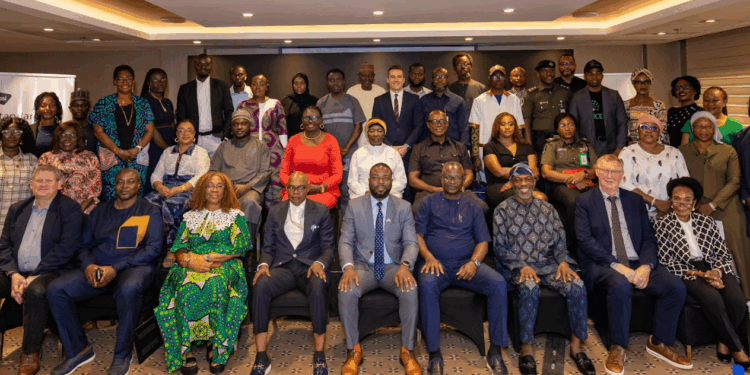The federal government and the United Kingdom have launched a Standards Partnership Programme to enhance trade, boost sustainable and inclusive growth through the use of international standards.
The programme with the theme, “Enhancing Nigeria’s Quality Infrastructure – Boosting Trade” was organised Wednesday in Abuja by BSI, the business improvement and standards company, in collaboration with the FDCO (Foreign, Commonwealth & Development Office).
The event gathered private sector enterprises and government stakeholders to discuss the role of National Quality Policy and quality infrastructure in delivering trade and development objectives.
In his remark, BSI Knowledge services director, Richard Taylor expressed delight in hosting the event in Nigeria as part of the Standards Partnership programme. He said raising awareness and understanding of the value that comes from the use of international standards can bring huge benefits.
“The programme will support private sector enterprises in Nigeria to enhance trade, unlock new market opportunities and improve product competitiveness. We look forward to welcoming stakeholders to the event and continuing to collaborate on all planned activities for this year, to create impact and drive progress across Nigeria.”

Also speaking, Trade Market Access Lead, FCDO, Simeon Umukoro said, “We are delighted to collaborate with BSI, the National Quality Council and other key stakeholders in Nigeria through the Standards Partnership to establish a robust quality infrastructure, focusing on improving standardisation and aligning with global best practices, to enhance trade efficiency.
“The UK government is quite interested in working with Nigeria, especially on the trade front, to help promote trade across both markets.
Nigeria, as we know, is quite a great partner when it comes to presence in the United Kingdom. And what we are looking to do is indeed promote more trading relationships to explore prosperity, mutual prosperity for our economies.
“By continuing this work, we can boost Nigeria’s export capacity and further position Nigeria as a key player in the global marketplace,” he said.
Chairman/CEO, National Quality Council (NQC) Osita Aboloma expressed gratitude to the British government for the support and approach taken to drive the programme down to the operators at the value-chain level.
He said, “The whole idea is about getting businesses to know what is required in the quality infrastructure space and getting the quality infrastructure actors to know how to support businesses actively using international standards. The whole effort is focused on Nigeria-UK business partnership, importing and exporting seamlessly, and I must say, so far so good.
Speaking about the Council, he said; “The National Quality Council is a coordinating body on issues relating to quality in every sector of the economy. Our job is to ensure that each of the quality infrastructure institutions both in the public and private can be more sustainable and more efficient in what they do.”
Lead project manager, BSI, Riccardo Benvenuti while giving an overview of the Standards Partnership Programme and achievements in Nigeria, said the programme is a flagship UK-funded programme that is supporting Nigeria institutions and government standards bodies and business in Nigeria to unlock their potential to enter international markets.
“We are doing this, working with international standards and working with the implementation of the National Quality Policy. Nigeria has a really big potential and advantage with the already approved National Quality Policy, so we are supporting the National Quality Council, SON, NINAS and other institutions in implementing the National Quality Policy. This will give Nigerian business the opportunity to be able to compete with international markets and unlock opportunities to trade and compete with international competitors.”
Benvenuti said the programme will help businesses have clarity on what they need to export and what they need to ensure their products are ready to be exported and also ready for the Nigerian market. “We are not only talking about exporting, but also talking about the safety for consumers in Nigeria.
On the acceptance of Nigerian products in UK and parts Europe, he said “part of the programme will be focusing on leather, cashew, tea and coffee. We will start working from those sectors as a pilot and to see the gaps in the quality infrastructure. Whether they need more training on metrology, training on accreditation and what they actually need to work with the private sector, to educate and support them to export to international markets.”
For director general, Nigerian National Accreditation System, Dr. Celestine Okanya said as an accreditation body the partnership programme will definitely impact the volume of Nigeria’s export, adding that the programme has helped NINAS to conduct what he termed peer-evaluation.
“Peer evaluation is a system where all the accreditation bodies in the world send representatives to come and evaluate what Nigeria does in terms of our accreditation system. After that evaluation, and they find it equivalent to the one of America, UK, South Africa and others, then whatever certificate we issue here will be accepted by all the member countries without need for any retesting or inspection and all that. So before this programme, we were not there yet.
“But because of this programme, it provided us the opportunity to conduct the necessary assessment, necessary audits for our gaps, and then those gaps, they found, they closed it. They got us resources, funds and experts to close the gap, and now the peer evaluation has been done.
“So I think it’s big news for Nigeria coming very soon because our rejects were happening when we didn’t have that peer evaluation. So things are changing,” he assured.
Speaking on acceptance of Nigerian commodities abroad, Okanya said the announcement of Nigeria becoming an MRA (Mutual Recognition Arrangement) member will reduce the need for even testing of our products abroad.
The Standards Partnership programme is an integral part of the UK Government’s Centre of Expertise (CoE) for Economic Development and Trade, meeting the approach of using international standards as tools to support trade objectives and helping to build resilient supply chains. The UK Government has committed £3m of funding to this programme globally.
The programme, officially launched in 2023, in 11 countries and island regions including Nigeria aims to increase the use of international standards to foster innovation and increase trade; facilitate inclusive and sustainable growth of supply chains in the target economies and also improve export potential, increasing the volume of products and services that meet international standards.



